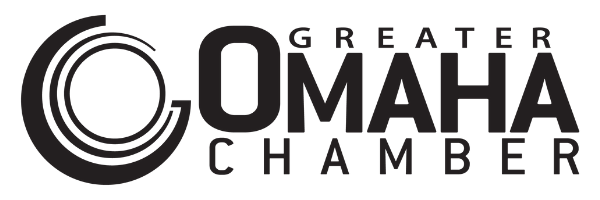I Opening Retreat
Twice rejected once accepted, September 15th, 16th, and 17th marked my beginning journey into Leadership Omaha 47 (LO47). Leadership Omaha trains leaders in the Omaha area about different aspects of the community and fosters private and public collaboration to improve Omaha as a whole. Hundreds of people apply each year and only 50 are chosen to participate. Before the kickoff weekend my anxiety ramped up. I turned to a good friend and stalwart community king, Jay Kline, for guidance. Jay and I met for coffee and I asked how I could maximize my experience in Leadership Omaha. He left me with sage advice, “connect with everyone at every opportunity.” Getting to know as many of my 50 cohort members as possible in just three days felt daunting. Our facilitators recommended sitting with new people at every juncture possible, advice which put me into an uncomfortable position, but what did I come here for, to be comfortable? No, I came to make an impact, to meet new people, and to engage with the Omaha community in a way I don’t regularly. I buckled in for a long weekend of listening, growing, and making the most out of a unique opportunity.
A wise leader emphasized to me early in my career that people don’t care how much you know until they know how much you care. Using this as a mantra I sought first to understand my classmate’s “whys”: The reason they wanted to be in LO47, why they care about community, and why they seize the day. It showed me a diverse answer that can’t be boiled down to a catchy, buzz word laden phrase. I was reminded that a community is built of people and they’re vibrant, unique, and special in their own ways. And, as such, I challenged myself to be brave and authentic in my own replies when questions made their way to my ears. I came to grow, so grow I must.
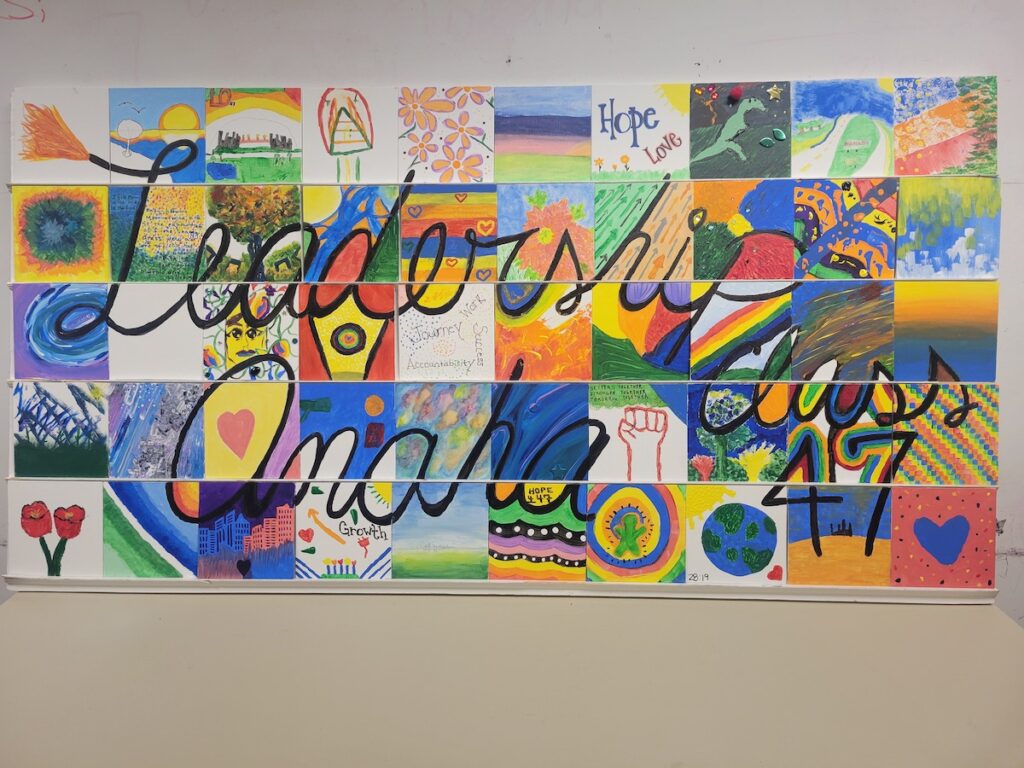
The importance of silence was emphasized by the facilitators of our several different group activities. Especially poignant was Alexander, previously a benedictine monk, and someone who knew the power of silence better than most. Leadership revolves around being an active
listener. I had a powerful reminder standing in front of me, choosing his words carefully, each of his words carried the impact of a truck – it showed me to get comfortable in my own silence, to give others space to speak, and to listen intentionally. My bones shrieked at the want of filling the space left by others, but I had little choice but to stay in discomfort and listen intentionally.
Our first piece of homework was to use a dollar given to us by the Greater Omaha Chamber of Commerce to buy an object representing our leadership style. My fellow classmates’ ideas ranged from dollar tree thank you cards to practice gratitude, safety earplugs to cut out the
noise and focus on urgent important tasks, and seeds from a local library that remind you to grow your people. All items had salient real life implications. I left the circle of leadership items with certain people I wanted to meet, and not just to get some zinnia seeds!
Each night we had a quality time activity designed to bring down our walls and encourage fellowship. Night one was a catchphrase like game with famous peoples’ names in a bucket. The group laughed uproariously as people guessed frantically at the names. Seeing people who were strangers come together quickly to have fun together lessened the barriers we’d all be facing when harder work was to come. After a winner was crowned we all carpooled to a local bar in Ashland, Nebraska. Personal anecdotes flew across bar tables and quickly the group felt like a close group of friends from college. A fellow LO47 member and I dove into an incredibly personal discussion, sharing our medical diagnoses, medication regimens, our wins with new doctors and medicine updates that transformed our lives. Another LO47 member talked about the struggles of growing up with inattentive parents and how he’d vowed to do better. Kinship began in the trenches of a dive bar in Ashland and friendships forged into lifelong bonds in the crucible of LO.
Day two took us into some community minded exercises where we envisioned the Omaha of today and the Omaha of tomorrow. People voiced concerns about rising housing costs, the state of streets, and the ever controversial street car. We spoke of an interconnected future Omaha with more access to healthcare and opportunity. The exercise asked us to further challenge ourselves with committing to bridging the gap ourselves. Little did we know how much this exercise would come back to us over the rest of our retreat.
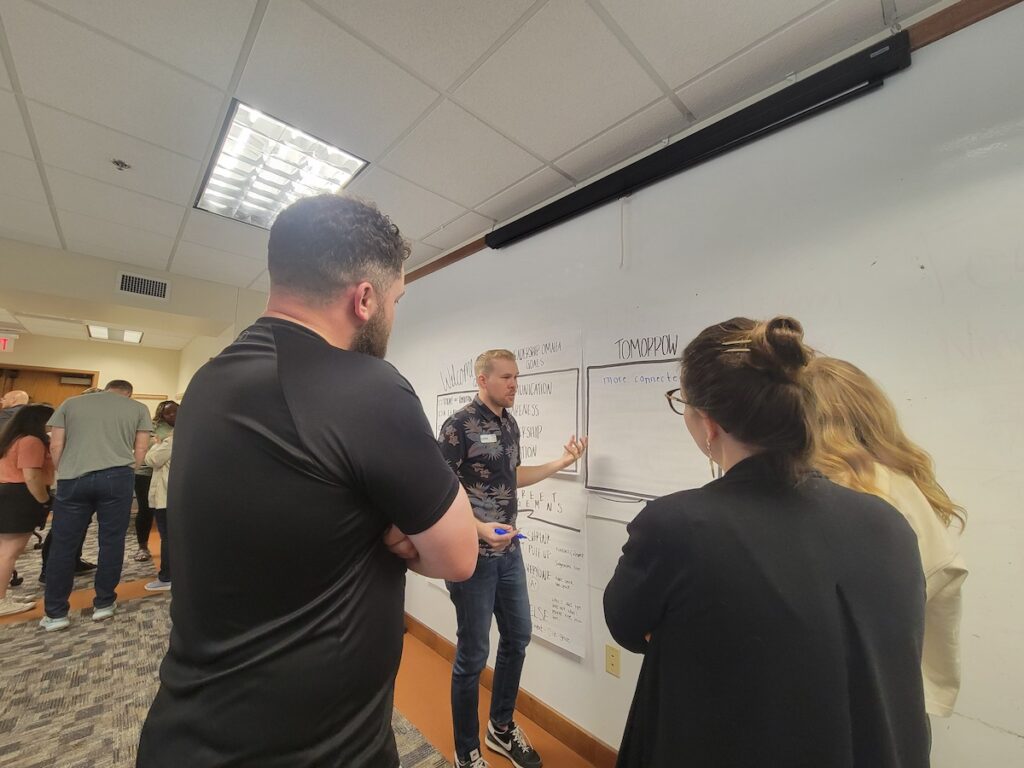
After lunch we were introduced to the group who’d be our small group, in my team’s case, team Alpha was born. We built out guard rails for how to approach shared work, shared experience, and a way for us to all engage safely and confidently in our upcoming journey. Our team valued
honest, open, transparent communication, doing what’s asked by the group, and having the je ne sais quoi of entrepreneurial verve. With our rules laid out in front of us we found a small space to answer the prompt “If you really knew me…” We each had to fill six minutes and honor any silence left by our small group members. Hardly a person struggled to fill their six minutes but all of us struggled to not ask follow up questions. We cried, cheered, shared, and absorbed what everyone spoke about, with the impact deepened by the permeating quiet.
The nighttime group activity shook us Monday. Our task, a rap battle using words from the today/tomorrow Omaha exercise earlier in the day. The experience created joy, trash talk, and beaming smiles all around the room. The hooks slapped, the beats were certified fresh, and the
creativity flowed wildly. The battle culminated in a freestyle using 10 chosen words, no prep time to write, and Queen Debra rocked and rolled her way to the throne for her team. She was seamless and clever and quick on her feet. The applause rang through the retreat’s hallways
and her smile bloomed into a grandiose grin.
Tuesday we learned about our group project: to complete volunteering with different organizations representing LO’s curriculum topics throughout the program The goal, to connect us more deeply to people in the community who are already doing the work to improve our home. Our team will be developing our group project over the next 3 months then executing it for the following 4 months while we complete Leadership Omaha with an astounding feather in our caps. We will make an impact in our community and present on the implications at our graduation ceremony in June 2025, and I’m looking forward to telling our story.
Our last exercise was making goals for before our next LO47 session. I personally committed to connecting for coffee, lunch, or drinks with 3 classmates before our next session. The goals from our class were diverse and unique. I am proud to stand shoulder to shoulder with giants with diverse backgrounds and accomplishments, who, after the retreat left me with a sense of kinship. Reflecting on my experience I am exhilarated and ready to tackle the challenges that face Omaha and I’m committed to learning about challenges outside my comfort zone so that my unique strengths can play their role in helping Omaha move in a positive direction.
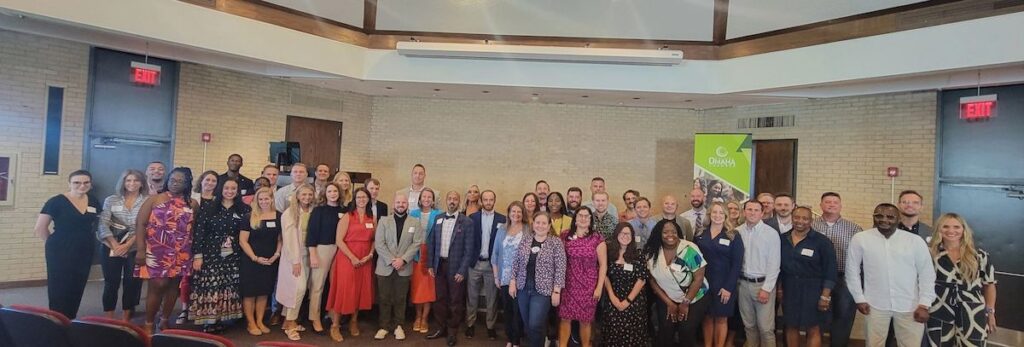
City Environment and Inclusivity
Our first two sessions of Leadership Omaha taught us about parts of the city that might go unseen to many. We learned about Omaha’s past and present to help shape its future in our City Environment session. Inclusivity taught us about how Omaha has different organizations striving to ensure all people have a place to live, work, and pursue happiness. Both sessions had experts present unique takes that resonated and cemented new information for our cohort.
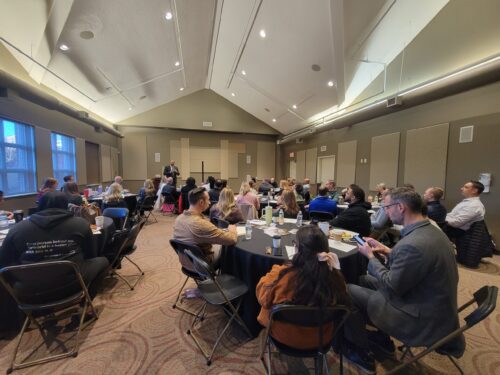
City Environment taught us about the built partitions of Omaha. Its roads, structures, trails, plazas, and other man made creations. We learned about how Omaha came up from being established in the 1800’s to its current position. To learn about Omaha’s history we heard two presenters. First was Dirk Chatelain, author of 24th and Glory, and he discussed with us the racial segregation of Omaha’s past and told an inspiring story of young men, sports, and civil rights. Next was the city of Omaha planning department’s Derek Miller, he told us about the city’s history from a more how the city grew and why it could or couldn’t take on new growth in different directions due to flood plains and state laws. The juxtaposition of an architectural versus human story gave us a fully fleshed out idea of how Omaha came to be the city it is today. Derek left us with a do out, help fill out the future of Omaha planning questionnaire so that we can shape the Omaha of tomorrow.
Our inclusivity seminar started at QLI, a neurological rehabilitation facility, and topics ranged from visible to invisible hinderances to people’s lives. We began the day with a straightforward seeming exercise. We were all given stickers on a part of our bodies that we couldn’t see and told to form groups without talking. Quickly enough the room was divided into 4 different sized groups of people. Our exercise administrator, Bradley Ekwerekwu, asked us how it felt to be put into groups and wonderful, thoughtful, and expressive conversation flowed. Next, he moved our different sticker groups to different areas of the room and asked us how it felt to be separated based on something as arbitrary as our sticker types. One group was cordoned off in a small area of the room by a barrier of chairs, and truthfully it was hard to even notice until it was pointed out. We had a group of people who didn’t go to their respective sticker area because one felt left out as we moved to our assigned areas and a lot of conversation was spent on why people joined the lone person at the front of the room. This exercise showed just how easy it is to maintain the status quo for me personally when an injustice is being systemically carried out. Hearing different people’s takes on how they felt moved me to ensure I am rooting out injustice wherever it lives in Omaha.
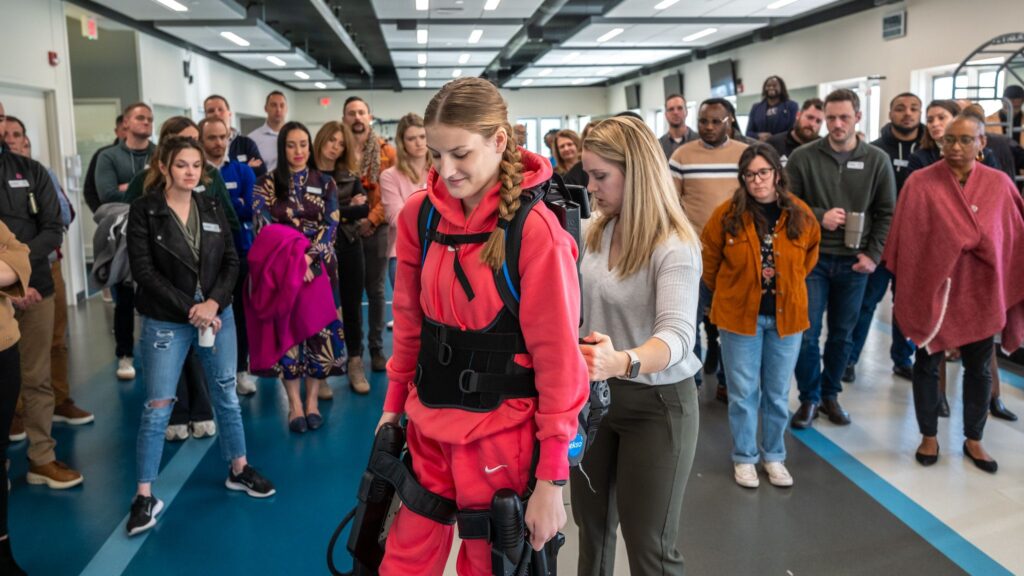
Next we got a tour of QLI and saw how their groundbreaking rehabilitation facility helps people with invisible accessibility issues gain a new footing in life. They help rehabilitate people with neurological injuries and give them a new license on life. They pioneer independent living, sport, and recreation for people living with paralysis or other neurodegenerative conditions. We heard some very inspiring stories and saw some people who were able to fully reform their lives after serious accidents. It was uniquely powerful. QLI showed our class that accessibility and inclusion exists on many different and unexpected levels.
The conversations started by both the City Environments and Inclusivity seminars stand out in my memory all this time later. People feeling empowered by their experiences to speak out and act stands out in my mind as why we are doing these seminars. Learning works best in groups who can challenge our own perspectives, and this group has a strongly diverse background. We’re onto the next session, and I’m excited to keep learning.
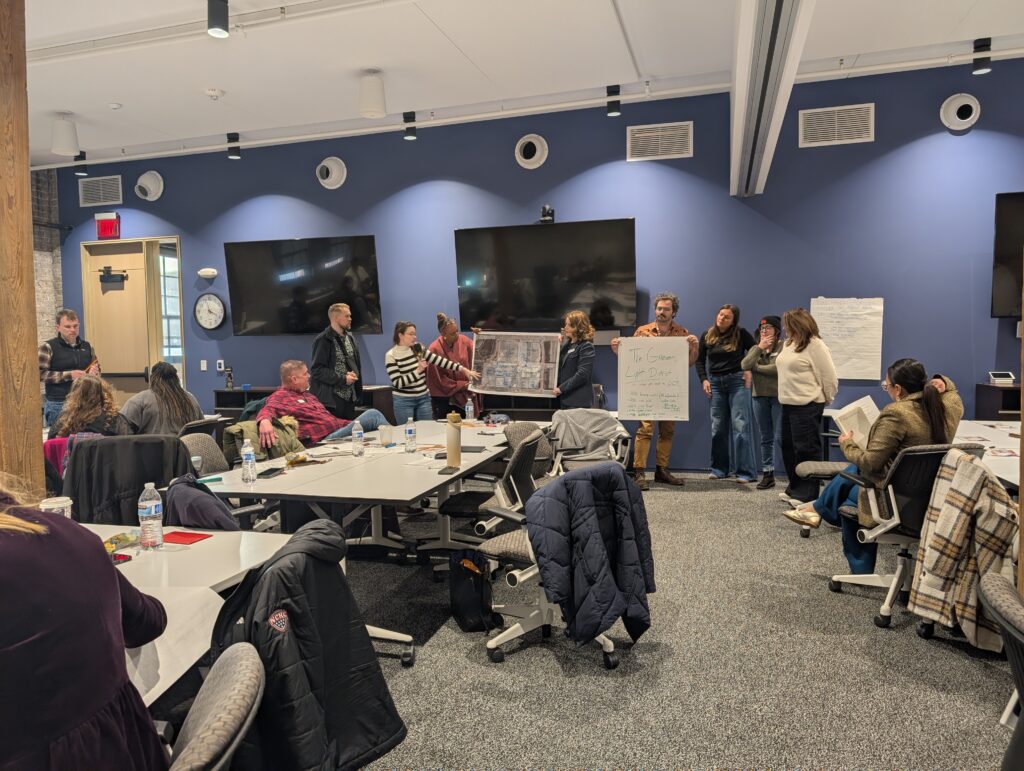
Economic Development Seminar: Economic Development and Community Growth in Omaha
Leadership Omaha Class 47 had the unique opportunity to learn firsthand about the intentional and forward-thinking approach that makes Omaha a thriving and vibrant community. Our seminar on economic development, held in one of the city’s most iconic spots—the Kimpton Cottonwood Hotel—provided valuable insights into the collaboration between city planners, engaged community members, and the public-private sector that drives Omaha’s growth.
Alec Gorynski, SVP of Economic Development at the Greater Omaha Chamber, kicked off the day by diving into Omaha’s competitive edge. The data Alec shared resonated with our class. Omaha ranks 4th among peer cities for overall quality of life, largely driven by our abundant arts and culture, a strong labor force, and low unemployment. He emphasized that our city’s commitment to developing a skilled workforce is a cornerstone for sustaining future growth, further fueled by a relatively low cost of doing business—ranked third among peer cities. These insights reinforced the importance of not only nurturing Omaha’s existing strengths but also positioning the city for a successful future.
Another highlight was hearing from two brilliant City of Omaha staffers—Bridget Hadley, City Planner III, and Jacquelyn Morrison, Deputy Chief of Staff for Economic Development. Their discussion illuminated the strategic partnerships that are critical to Omaha’s growth blueprint. These partnerships are not only focused on expanding the city but also on ensuring that growth is equitable and sustainable. Their work reinforces the idea that intentional urban planning, supported by strong collaboration, is key to building a community where all residents can thrive.
Leslie Smith, Executive Director of the Omaha Municipal Land Bank, shared a fascinating look at the organization’s role in revitalizing vacant, abandoned, and deteriorating properties. With around $1.7M in annual funds, the Land Bank’s work is both transparent and impactful. They focus on bringing new life to these spaces in a way that promotes responsible development while advancing community priorities. This discussion helped us appreciate how thoughtful urban development can directly impact the vitality of neighborhoods and enhance overall community well-being.
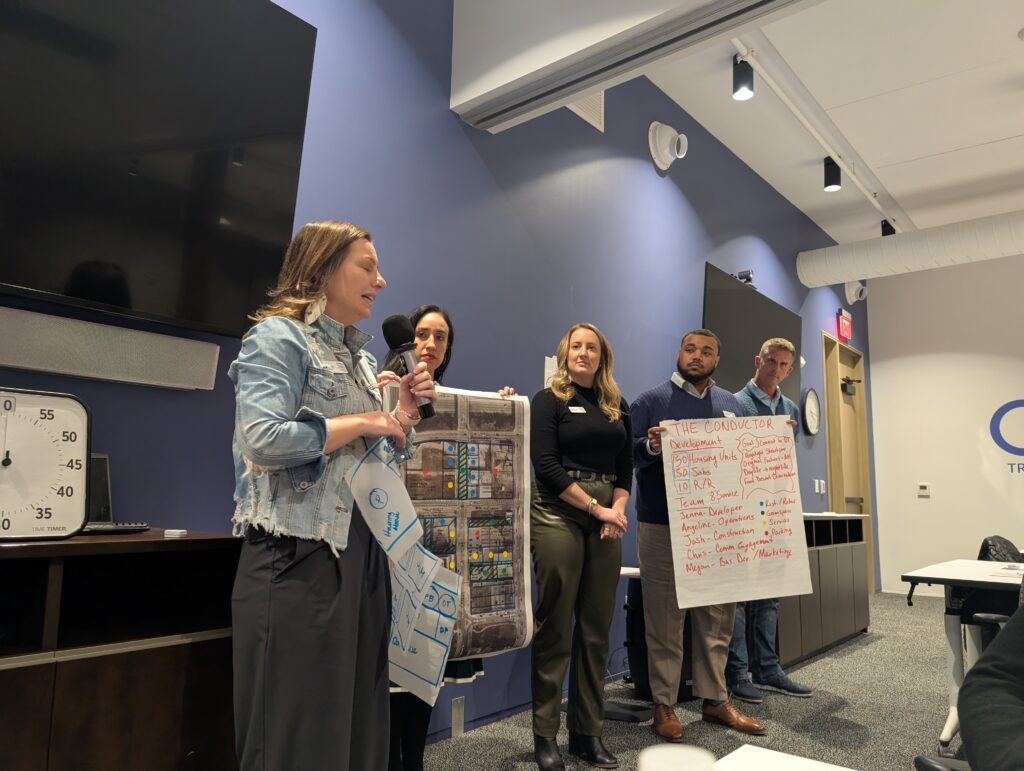
In the afternoon, we visited Millwork Commons, hosted by United Way of the Midlands. Shawna Forsberg, President and CEO, spoke about the organization’s mission to address social and economic disparities. Shawna emphasized UW’s work to connect families with essential resources—highlighting how partnerships can also help solve complex social issues alongside economic development. It reinforced the idea that sustainable community growth isn’t just about business development but about ensuring that all individuals have the resources they need to thrive.
The day wrapped up with an engaging group activity where we had the chance to pitch our own urban development plans for the area just east of Midtown Crossing. This hands-on exercise gave us a real-world understanding of the complexities of urban planning, and we left the day feeling more connected to Omaha’s growth story and inspired by the possibilities for the future.
For more about Omaha’s Economic Strategy for 2025-2027, visit here.
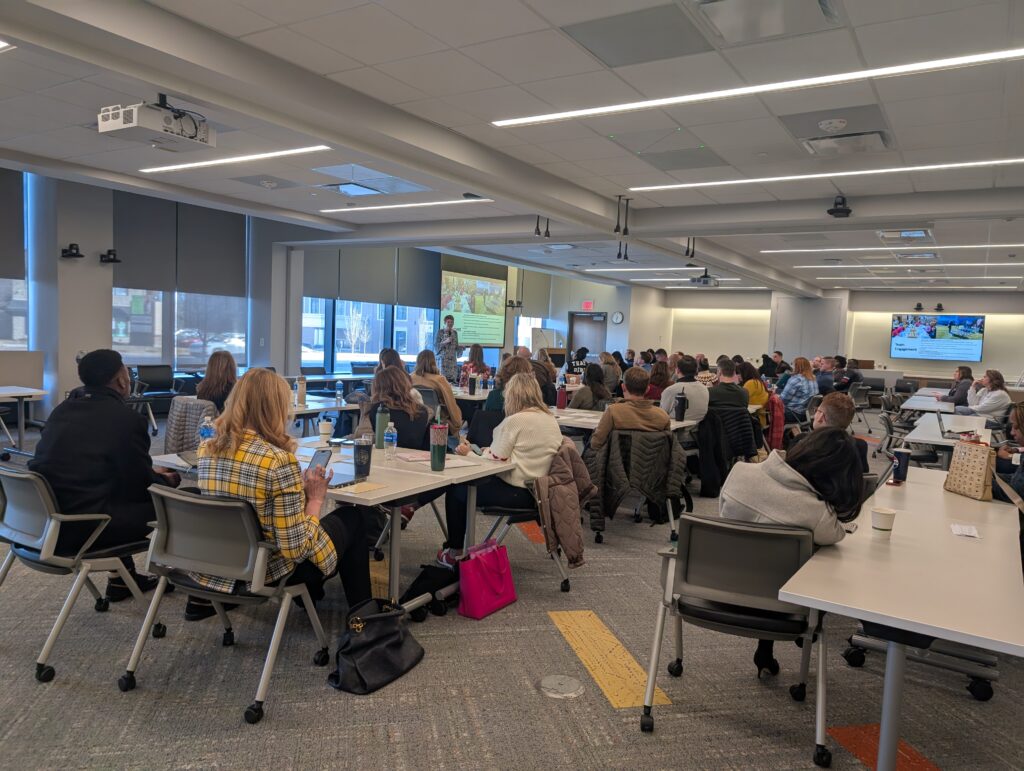
Health and Human Services Day: A Transformative Experience with Leadership Omaha Class 47
Health and Human Services Day for Leadership Omaha Class 47 began at Children’s Nebraska, where participants were guided by Marcus Bell, CEO of the Omaha Bridges Team. Marcus led us through an impactful Poverty Simulation Activity that opened our eyes to the difficult realities many individuals face daily. Through this simulation, we gained a deeper understanding of the complex challenges that come with accessing social safety nets, pursuing higher education, and navigating life with limited financial resources and transportation. It was a powerful reminder of the systemic barriers that many in our community face, and it reinforced the importance of creating more accessible and equitable systems for everyone.
The day continued with Megan Connelly, VP of Community Health and Advocacy at Children’s Nebraska, who provided an insightful overview of the hospital’s services and its deep commitment to the well-being of children and families across the region. Children’s Nebraska is a critical resource in our community, offering a full range of services, including primary care, specialty care, emergency medicine, and inpatient services. As a free-standing children’s hospital, it serves as a vital partner in ensuring that families have the support they need to thrive. Megan’s presentation highlighted the importance of collaborative efforts in improving health outcomes, and it reminded us all of the incredible impact healthcare organizations like Children’s Nebraska have on shaping healthier futures for our children.
After lunch, the group transitioned to Heart Ministries, a non-profit organization serving northeast Omaha. Heart Ministries provides 3.2 million pounds of fresh and shelf-stable food to community members each year. However, their work goes far beyond addressing food insecurity. Through their comprehensive range of services, including medical, dental, vision, mental health, occupational therapy, and case management, Heart Ministries is truly changing lives. One of the highlights of the visit was the Fresh Start Program and Fresh Start Laundromat, which serve as pillars of dignity and support for individuals and families. Additionally, their new social enterprise, Fresh Floral, offers a unique model that creates job opportunities while promoting community well-being.
As we toured Heart Ministries, it was evident that the organization is rooted in a profound commitment to the principle of “dignity for all.” This was especially evident as we observed the Choice Food Distribution Program, where community members have the power to choose the food they receive, empowering them in a way that traditional food pantries often do not. The clinic areas and laundromat also stood as testaments to Heart’s holistic approach to community care.
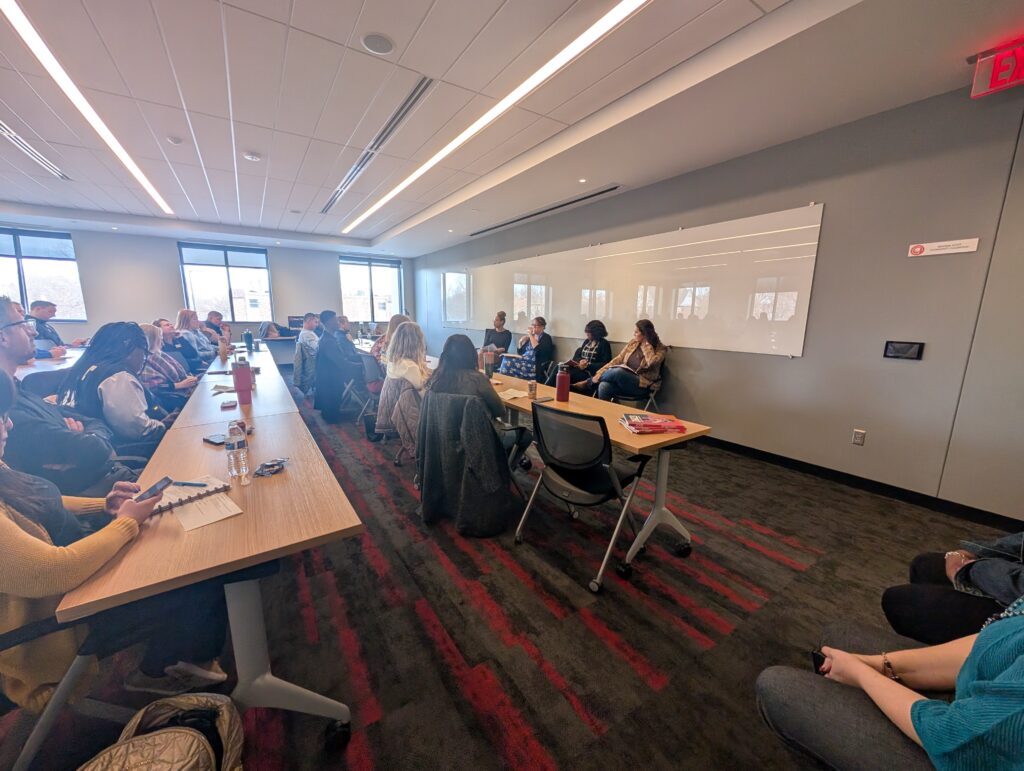
The day concluded with a panel discussion moderated by Aja Anderson, CEO of The Wellbeing Partners, who led a thoughtful conversation on the intersection of wellness, child welfare, housing and homelessness, and mental health. The panelists shared valuable insights on the importance of a multifaceted approach to well-being, one that recognizes the interconnectedness of health, housing, and social support systems. The conversation underscored how addressing mental health and housing instability is crucial in ensuring that individuals can not only survive but thrive.
